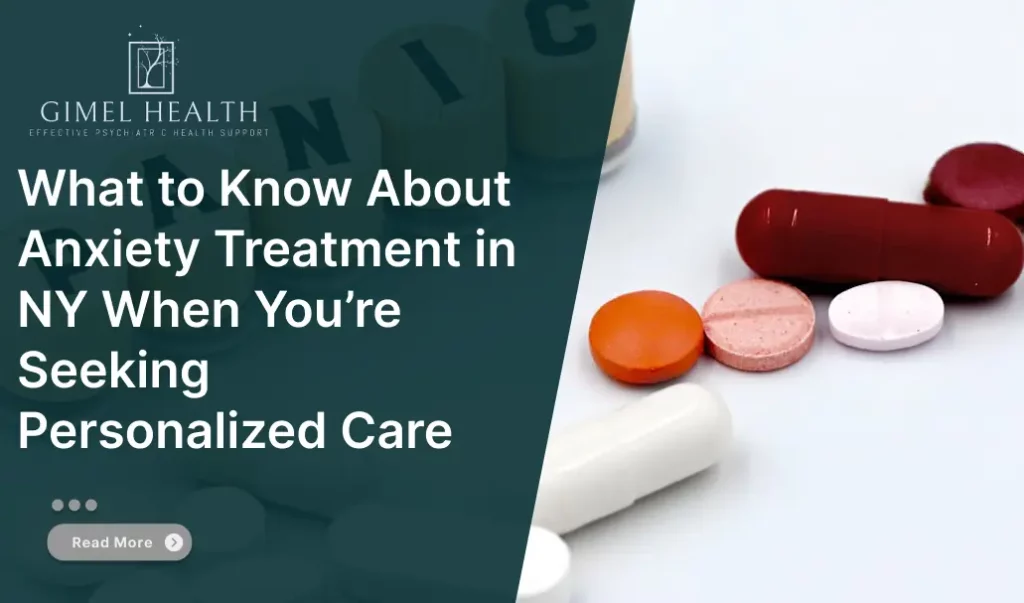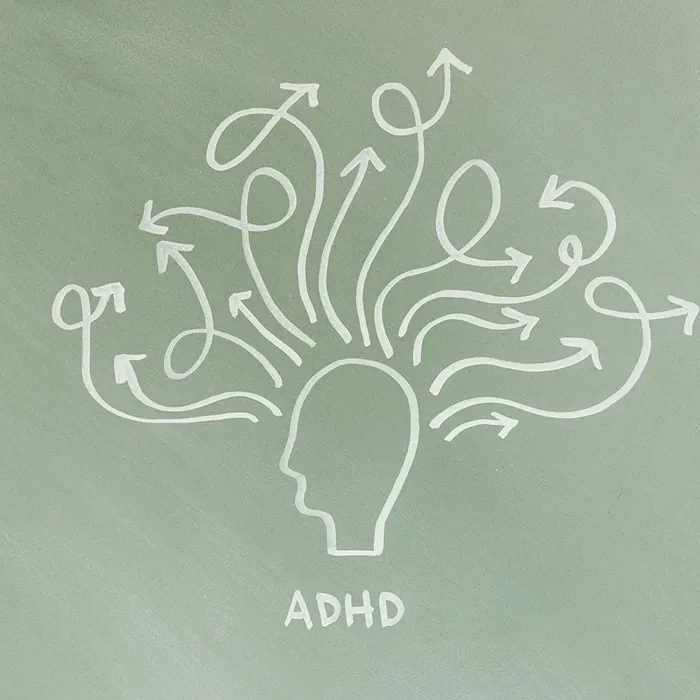
Anxiety is one of the most common mental...Read More

Effective Adult ADHD treatment NJ goes far beyond prescriptions. I take a holistic approach that blends medication management with therapy, coaching, and long-term lifestyle strategies. Whether you are a young adult navigating the transition from childhood ADHD or someone newly diagnosed, I provide structured tools to build executive functions, improve organizational skills, and strengthen time management. Through ADHD coaches, support groups, and family therapy, we also address low self-esteem, social skills, and the emotional impact of attention-deficit/hyperactivity disorder.
Your progress is closely monitored with regular check-ins to track symptoms of ADHD, sustained mental effort, impulsive behavior, and physical concerns like blood pressure or related health problems. When appropriate, I prescribe and adjust ADHD medications for adults based on your treatment plan, co-occurring mental health conditions, and personal goals, always with your daily life in mind. I rely on evidence from clinical trials, resources from the National Institute of Mental Health, and systematic reviews to inform long-term care. Together, we build an adaptive, supportive framework that evolves with you and promotes success across every stage of life.
I begin each Adult ADHD Treatment journey with a thorough evaluation of symptoms of ADHD, including inattentive symptoms, impulsive behavior, and daily tasks challenges. Using current guidelines from the American Psychiatric Association and the Statistical Manual of Mental Disorders, I assess your medical history, check for comorbid anxiety disorder, mood swings, or substance use disorders, and rule out other mental health conditions like bipolar disorder or personality disorders. I also evaluate risk factors such as brain injury, social media overuse, or childhood ADHD that may influence executive functions or academic performance later in life.
Your treatment plan is tailored to you—including ADHD medications, Cognitive behavioral therapy, Medication management, skills training, and lifestyle changes like physical activity or mindfulness meditation. I coordinate with your healthcare provider to select the most effective types of ADHD medications (e.g., stimulants or non-stimulants) and adjust dosing based on daily life and work performance impacts, ensuring balance between effectiveness and side effect management. When appropriate, I may integrate ADHD coaches or support groups to strengthen coping skills, reduce negative consequences, and improve sustained mental effort in both professional and personal settings.
One of the most nicest, kindest and considerate doctors I met.
He went over with me thoroughly on the documents and was generous enough to explain me everything that I asked.
I think he is a real doctor of people and not just someone that’s write prescriptions.
I wanted to sincerely thank Dr Feldman for his help during my time in the U.S.
His support, especially when my country was under attack, flights were grounded and medication was hard to access, made a real difference.
He was very kind, professional, and helped me get exactly what I needed in the best and most thoughtful way.
Michael Feldman is an exceptional mental health provider who truly listens and takes time to understand patients’ concerns. He provides thoughtful guidance and support.
I met Michael Feldman after years of search and trial and error. If you look for a professional who is invested in his patient’s progress, research-oriented, with a deep understanding of the body-mind connection and a wholistic approach to treatment, look no further.
Dr Michael Feldman is an amazing doctor. He prescribed the proper medication in the right dosage for me. He did this because he listens and asks very good questions. I highly recommend him and his practice at Gimle Health.
Michael Feldman is a wonderful and caring P.A. He always gives 100%. He listens attentively and provides many insights I would never thought of by myself . I find having him in my corner invaluable and I could not recommend him more highly. He’s the best!
Michael is an amazing professional! He truly invests in his patients and provides care and feedback even during off hours. Although we have only been using his services for a short time, he already stands out as caring, knowledgeable, and confident in his approach. We plan to continue using his services and would absolutely recommend him to anyone!
Your journey to better mental health starts here. With advanced expertise in biology and psychiatry, I build exclusive medication plans backed by science. Contact me to schedule your initial consultation.
(201) 815-4351
440 West Str, Ste 307, Fort Lee Bergen County NJ 07024
Anxiety is one of the most common mental...Read More
Finding the right psychiatrist NJ is one of...Read More
Anger is a normal emotion, but when it...Read More
Premenstrual Dysphoric Disorder is a severe form of...Read More
Many mental health providers see patients who show...Read More
Medication management is one of the most effective...Read More
Adult attention-deficit/hyperactivity disorder can be influenced by a variety of possible causes. These include genetic predispositions, neurodevelopmental disorders, and environmental triggers such as brain injury or childhood trauma. Many adults with ADHD were undiagnosed during childhood and only recognize symptoms of attention-deficit like forgetfulness, distractibility, or impulsive behavior later in life. Risk factors include substance abuse, anxiety disorder, bipolar disorder, and other co-occurring psychiatric disorders. I conduct a thorough ADHD diagnosis by reviewing your medical history, treatment overview, and current mental health issues to tailor a precise and effective treatment plan.
ADHD medications such as stimulants and non-stimulants are primarily prescribed to improve executive functions, increase focus, and reduce impulsivity. For adult patients who also experience mood swings or symptoms related to mood disorders or anxiety disorder, these medications can indirectly stabilize emotional regulation. However, I monitor closely for potential interactions or side effects, especially in individuals with mental health conditions like bipolar disorder or depression. If blood pressure or emotional regulation becomes a concern, I adjust dosage or consider alternative medications. I may also recommend cognitive behavioral therapy alongside medication to address both mental and physical health conditions in a balanced way.
Absolutely. In addition to ADHD medications, lifestyle changes can play a major role in managing adult ADHD symptoms. I often recommend integrating physical activity, structured routines, and mindfulness meditation into your daily life. These changes improve your ability to complete tasks, stay organized, and cope with stress. Skills training and behavioral health coaching help with time management, sustained mental effort, and coping skills, while parent training and support groups offer community and structure. I help you develop a daily routine that aligns with your treatment plan, work performance goals, and long-term mental health.
Yes. While adult ADHD often stems from childhood ADHD, it’s possible to be diagnosed for the first time in adulthood. Symptoms may have been overlooked or misattributed to other mental health conditions or life stressors. Adult attention-deficit/hyperactivity disorder can present with inattentive symptoms, difficulty with daily activities, low self-esteem, and problems with organizational skills. With the right ADHD diagnosis, I can provide the most effective treatment options based on your medical history, daily tasks, and mental health disorder symptoms. Treatment often includes ADHD medications, talk therapy, and targeted lifestyle changes for sustained improvement.
Substance use disorders and ADHD frequently co-occur, especially in untreated or undiagnosed adults. I use a careful, integrated approach when treating adult ADHD in individuals with a history of substance abuse. I may collaborate with your healthcare provider or primary care provider to ensure coordination of care. Treatment might include non-stimulant ADHD medications, behavioral therapy, and referrals to support groups or specialists in substance abuse treatment. Managing both the effects of ADHD and the complications from substance use requires regular monitoring and a highly individualized treatment plan.
I help adult patients improve work performance and manage daily tasks by creating structured ADHD treatment plans that include coaching, executive function training, and therapy. We work on strengthening your ability to sustain mental effort, stay focused, and maintain attention during important activities. Whether you’re struggling with academic performance, job deadlines, or household organization, I offer tools like coping skills strategies, ADHD coaches, and behavioral health techniques. I also monitor ADHD medications and side effects, making sure the treatment supports both your cognitive functions and mental health goals.
It’s common for adults with ADHD to also experience mood disorders like Bipolar Disorder or anxiety disorder. As part of your treatment plan, I assess for coexisting mental health conditions and tailor your care to support both. This might involve coordination with your healthcare provider, adjusting ADHD medications, and incorporating cognitive behavioral therapy to manage overlapping symptoms like mood swings, low self-esteem, and impulsive behavior. I also evaluate for risk factors such as substance use disorders or personality disorder, which can affect long-term outcomes if left unaddressed.
Yes. Adults with ADHD can experience health problems like elevated blood pressure, poor sleep, or increased risk of substance abuse. These issues may affect daily activities, emotional regulation, and long-term well-being. I consider your full medical history and physical symptoms when designing your treatment, and I coordinate with primary care providers as needed to monitor your overall health. Managing these challenges early supports better disease control and helps prevent negative consequences later in life.
Absolutely. Untreated ADHD often leads to challenges with academic performance, work performance, and completing daily tasks. I provide strategies to strengthen sustained mental effort, improve focus, and manage executive functions—like prioritization, task completion, and attention to detail. With the right support, adults can experience meaningful improvements in productivity and professional success. Support options may also include ADHD coaches and online community resources to reinforce new coping skills and structure. In some cases, integrating family therapy or parent training—especially for young adults—can further enhance accountability and help maintain long-term behavioral health improvements.
We use cookies to improve your experience on our site. By using our site, you consent to cookies.
Manage your cookie preferences below:
Essential cookies enable basic functions and are necessary for the proper function of the website.
These cookies are needed for adding comments on this website.
Google reCAPTCHA helps protect websites from spam and abuse by verifying user interactions through challenges.
Google Tag Manager simplifies the management of marketing tags on your website without code changes.
Statistics cookies collect information anonymously. This information helps us understand how visitors use our website.
Vimeo is a video hosting platform for high-quality content, ideal for creators and businesses to showcase their work.
Service URL: vimeo.com (opens in a new window)
You can find more information in our Cookie Policy and Privacy Policy.